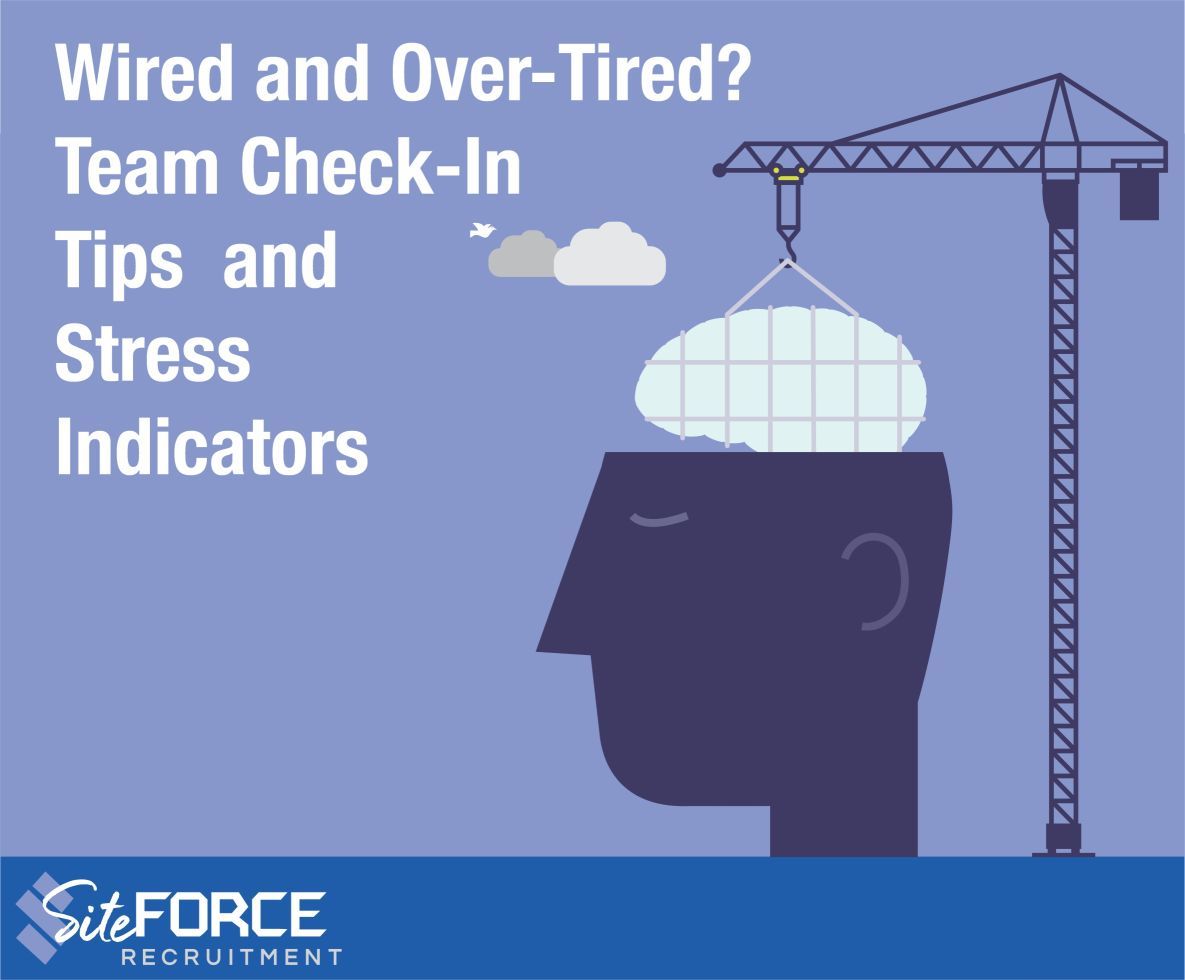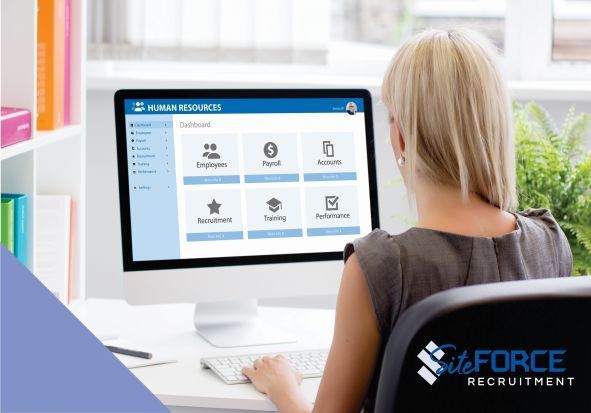Wired & Over-Tired?
Team Check-In Tips and Stress Indicators

This year, World Mental Health Month in October's message is simple: "Look after your mental health, Australia".
People are our business, and we know people. We have a deeply ingrained ability to get the facts quickly and make assessments that are proven time and time again in the field. We know the ins and outs of hiring within all industries and fields, so you can be assured we will match you with the best labour solution possible.
Besides having a sense of humour (you need one in this business), we aim to make business enjoyable whilst delivering excellent results. At the end of the day, this is a business about people, and if you keep them happy and deliver exceptional results for all concerned, we all benefit from a brighter future.
A healthy company culture is a basic component of any successful organisation. It lays the groundwork for strong employee engagement, retention and performance. In fact, according to the latest research, 70% of employees and leaders say a supportive culture is more important to business success than strategy and operations. While some organisations have successfully adapted to this new world of work, others have struggled to build, improve and maintain a company culture that supports their employees.
Below are some tips for both employers and employees that we have found that make a difference in maintaining a connected, happy and health workforce culture. Also included are some current research, indicators, tips and resources on what you can do if you are experiencing a drop in productivity or performance and where to seek help:-
Connecting With Team Members
There is no one size fits all solution to well-being, but there is a well-being solution for all. Many of us can hope for a one-size fits all approach to well-being, and then lose motivation when something doesn't work for our team members or us.
Each of us is unique, and our well-being requirements and resilience needs are also unique. No two people have the exact same values, beliefs, life circumstances, priorities and dreams. Well-being to a first-time parent will most likely involve more sleep and help around the house, whilst well-being to a tradie starting their first full-time job will be mastery of work skills and fitting into the workplace culture more important.
Our starting point is as simple as asking each team member how they are and what they care about. Research shows that the simple act of asking and talking about well-being, is a well-being boost in its own right! And supporting your team members' well-being is more straightforward than you may think. In your one-to-one catch-ups, instead of starting by reviewing their tasks in progress, try taking the first five minutes to ask them the questions below:-
· How are you?
· What is important to your well-being at the moment?
· What does well-being mean to you?
· What is working well for your well-being at work?
· What would you like to see different to support your well-being at work?
· What are your stressors at the moment?
· What helps when you are experiencing pressure?
· What would you like to see different to support your well-being at work?
· What support would you like now for your well-being?
Providing opportunities for autonomy, flexibility, connection and the ability to grow and develop skills are all proven ways to support well-being at work.
How to Deal With Prolonged Stress
If you think that you are being affected by prolonged stress, there are things that you can do to help find relief. Establishing effective stress management practices that suit you personally is important for maintaining good physical and mental health.
Even if you cannot always control the sources of your ongoing stress, you can manage the ways that you respond and cope. Some strategies that may help are listed below.
1. Eliminate the Stress
One of the best ways to reduce prolonged stress is to address it at its root cause. Of course, this may not always be possible. In other cases, it might involve making a major change in your life and managing the expectations you have in your mind. If your job is causing your stress, you may want to look into finding a different job, or shifting into a different role at your current job. Significant changes in themselves can be a source of stress, so it is important to evaluate your options and determine the potential pros and cons of making a change. Changing now might temporarily increase stress and anxiety, but it may pay off in decreased stress and greater happiness over the longer term.
2. Reframe Your Thoughts
Sometimes, how people think about the sources of their stress can make the situations worse. Cognitive distortions such as all-or-nothing thinking, fixation, over generalisation, and magnification can make stress things seem worse than they are or even overwhelming.
Cognitive reframing involves changing the way that you think about these stressors in order to better manage your emotions and stress response. For example, this approach might focus on helping you change catastrophic thoughts that focus on worse-case scenarios into less stressful, more realistic ones.
3. Set Limits For Yourself and Others
If you feel overwhelmed by your stress, ask for help. Delegating some responsibilities while cutting out some non-essential tasks may also be beneficial. It is important to decide what things you need to do while cutting out non-essential sources of stress. This might mean saying no to some obligations, setting boundaries with people, or delegating some responsibilities to others.
Boundaries can be an important part of managing stress, so learning how to recognise when you need to set some limits is important. Some signs that you need to establish some limits:
· You feel like people are always asking too much
· You find yourself saying yes to things you don't really want to do
· You always feel drained by all of your obligations
Learning how to say no isn't always easy. However, finding ways to limit your obligations can help significantly when coping with prolonged stress.
4. Take Care of Yourself
When you are facing ongoing stress, it is particularly important to practice healthy self-care. Give yourself breaks to relax, follow a nutritious diet, get regular exercise, and find ways to protect your sleep.
Exercise, for example, has a wide range of positive health benefits, including reductions in perceived stress and anxiety. However, research also suggests that experiencing stress also makes it more difficult for people to stick to their usual physical activity routine.
If stress makes it difficult to stay motivated to exercise, look for ways to gradually make exercise a part of your routine. Set small goals, even if it's 10 to 20 minutes of daily activity, and then gradually work your way up. You may find that, over time, engaging in physical activity actually helps you better cope with your stress.
5. Build a Support Network
While relationships can sometimes be a source of prolonged stress, having supportive people in your life to lean on also acts as an important buffer against acute and chronic stress. Research has found that social support is critical for both physical and mental health.
Not only does support help people become more resilient, but it also helps protect people from developing mental disorders related to stress and trauma. For example, one study found that social support helped reduce the effects of stress on symptoms of depression.
Finding support doesn't mean you need to have an enormous network; having a handful of friends and family members can provide the emotional support you need to manage your stress better.
6. Talk to a Therapist
Talking to a mental health professional is also a great way to take control of your stress and mitigate its impact on your health. Your therapist can help you identify the sources of stress in your life and come up with a plan to deal with them. This might involve developing new coping strategies or finding new ways to deal with difficult people.
If you are experiencing problems with alcohol or substance use or are experiencing thoughts of suicide, seek help immediately.
Resources:
R U OK?
https://www.ruok.org.au/findhelp
Lifeline
13 11 14
Suicide Call Back Service
1300 659 467
www.suicidecallbackservice.org.au
Beyond Blue
1300 224 636
MensLine Australia
1300 78 99 78
Kids Helpline
1800 551 800 (27/7 crisis support)
headspace
1800 650 890
www.headspace.org.au (direct clinical services)
Butterfly Foundation National Helpline
1800 334 673
http://thebutterflyfoundation.org.au
Open Arms – Veterans and Veterans Families Counselling Service
1800 011 046
Related articles:
The Secret Sauce of Matchmaking: Chantal Penny, The Human Matchmaker
The 'Great Exhaustion' and Mental Health
The Toll of Job Loss with Nathan Bishop: Identifying and Helping on the Slippery Slide
How to Explain Gaps In Your Employment – Turning a Negative into a Positive
SiteForce Recruitment specialise in labour-hire and permanent recruitment in the construction industry. We are committed to valuing people, safety and well-being, collaboration, trust and of course – results!
CONNECT with us via our contact page or bookings links on our website if you are looking to recruit for, get your dream job, or join our amazing labour force team.
#siteforcerecruitment #recruitment #labourhire #brisbanejobs #LookAfterYourMentalHealthAustralia #WMHD2022











